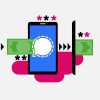AT&T Releases 'Realistic' Voice Software
AT&T released on Tuesday a new software program called Natural Voices, which it claims is "the most human-sounding computer-speech system in the world."
Natural Voices is the first commercial product to come from AT&T Labs, the research and development side of the business, and the new software's ability to recreate any voice suggests some intriguing possibilities for commercial applications.
The voices created by the software are still a little too automatic-sounding to compare to the soothingly sinister human-like tone of HAL in the movie 2001: A Space Odyssey, but it's a step up in quality for computer-synthesized speech, according to Bryant Parent, the product's manager.
The computer-speech system is designed for companies with call-center operations, application service providers with voice portals, and value-added resellers offering speech services.
Can I Help You?
With companies hoping to automate help-desk call-in operations as much as possible, real-sounding voices on the business end of the phone become even more important, Parent says.
"If the voice sounds terrible, callers will hang up," Parent explains. For the moment, customers hoping to license AT&T's Natural Voices technology have only three voice choices--a male baritone named "Rich," a higher-pitched male voice named "Mike," and a female voice named "Crystal."
Natural Voices still halts unnaturally from time to time or makes a slightly incorrect inflection on some words, but the gap is closing between human speech and computer speech.
Automate Any Voice
The voices for AT&T's software are drawn from lengthy samples of real people speaking, so theoretically any voice can be automated using the same technique, according to the software maker. Companies with distinctive, highly recognizable spokespeople--like James Earl Jones for Verizon Communications or Jamie Lee Curtis for VoiceStream Wireless--could one day automate a celebrity voice for their call-center operations, according to Parent.
Today, that's hard to imagine.
"This isn't going to replace people any time soon, and it's not meant to," says Michael Dickman, another AT&T spokesperson. "But it's interesting that the technology is getting so close. It's getting hard to tell the real from the automated."
AT&T hopes to sell the software, which costs $5000, to business customers in the automotive industry, and electronics equipment makers that want to integrate voice technology into products such as cell phones and PDAs (personal digital assistants).









































































